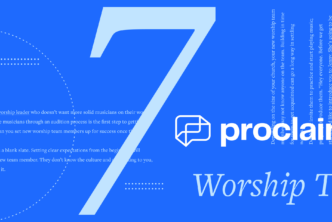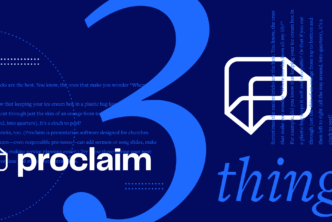Your worship team could sound better without buying better instruments or microphones. A little understanding of how sound waves work can go a long way toward improving how everything sounds in your worship center. Great acoustics will immerse congregants in the music, allowing them to focus directly on worshiping God by building a perception called “envelopment.” Great acoustics will also make the preaching easier to hear and understand. Here are four things to pay attention to in your worship center’s acoustics.
Reflection: the repetition of a sound due to a sound wave reflecting off an object
Simply put, reflection causes an echo. In the worship setting, shoot for eliminating reflection. Sound engineers want to control the environment, and having an unwanted echo creates a muddled mess. This is largely due to large, open rooms with high ceilings and no way to break up the reflecting sound waves.
Absorption: the way sound energy is absorbed when sound waves collide into materials and structures
This is crucial in altering a room’s acoustics. Absorptive material is used in the sound panels that are used to reduce reflection. If your worship center suffers from the echo in the above situation, install sound panels on the ceiling and walls to eliminate the reflection.
Diffusion: how sound energy is spread in any given environment
A perfectly diffusive environment is when key acoustic properties are the same throughout the entire worship space. This is difficult to achieve, but gives listeners the feeling of being enveloped or surrounded by the music when done right.
A practical way to attack this issue is to place sound boards converting all the 90-degree corners in the worship center into 45 degrees. Ninety-degree corners trap sound and make diffusion impossible. The ceiling also plays a crucial role in diffusion—if you have a rounded or peaked ceiling, it focuses the reflection of sound waves unevenly. Creating a sound-board “cloud” that would hang parallel to the floor would help distribute the sound more evenly.
Reverberation: the persistence of a sound after the original sound was produced
This is different than reflection because there’s no echo effect. Reverberation is caused by the original sound bouncing back and forth at a speed too quickly to be perceived as separate. Reverberation is also best when the sound engineer gets to choose how the reverb in the room is set via FX, but if you don’t have the capability to run FX, then reverb is a great sound property for your room to have.
Don’t let terrible acoustics discourage you—start understanding them, and make them your tool rather than your enemy.
* * *
Proclaim’s cloud-based presentation software is designed to enhance collaboration within your ministry team. Subscribe to start making effortless presentations today!




